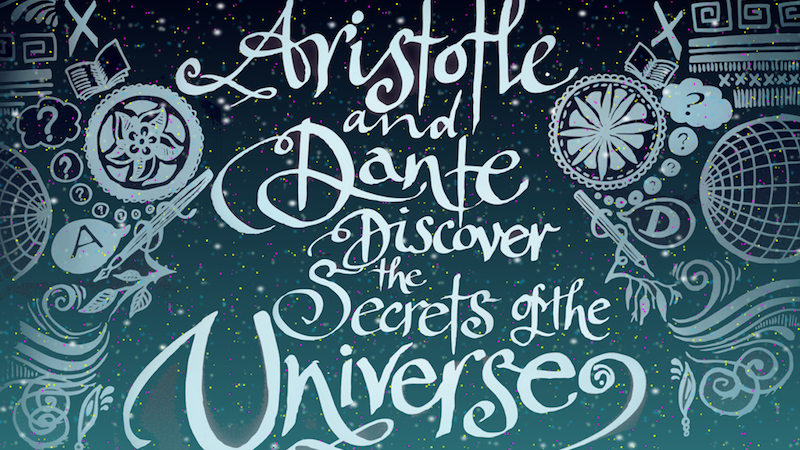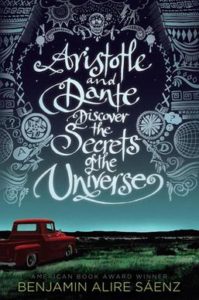
Aristotle and Dante Discover the Secrets of the Universe
Author: Benjamin Alire Sáenz
Genre: Young Adult / Coming-Of-Age
Publisher: Simon & Schuster
Review by Christoph Staffl
 It is summer. The year is 1987. Aristotle (aka Ari) and Dante meet for the first time at the refreshing pool. Unfortunately, Ari cannot swim but is able to keep his head above water. Dante recognizes this and offers to teach him how to swim. It is the beginning of a complicated relationship. Complicated, because the boys are very different. Ari, fifteen years old, is an introvert, shy, does not talk very much, and his relationship with his parents could be better. Dante, on the other hand, is very straightforward, talks a lot, reads fascinating books and even poems, and his relationship with his parents could not be better.
It is summer. The year is 1987. Aristotle (aka Ari) and Dante meet for the first time at the refreshing pool. Unfortunately, Ari cannot swim but is able to keep his head above water. Dante recognizes this and offers to teach him how to swim. It is the beginning of a complicated relationship. Complicated, because the boys are very different. Ari, fifteen years old, is an introvert, shy, does not talk very much, and his relationship with his parents could be better. Dante, on the other hand, is very straightforward, talks a lot, reads fascinating books and even poems, and his relationship with his parents could not be better.
In the following months, both of them undergo severe changes in their lives. The important part seems to be, that they are there for each other. But because of their differences, this is easier said than done. Sometimes Ari seeks out loneliness, which makes it difficult for Dante to understand his friend. Circumstances complicate things, but I don’t want to spoil anything.
“Remember the rain.”
One of the most interesting parts of Aristotle and Dante Discover the Secrets of the Universe are the characters themselves. The book takes place in the year 1987, and every single aspect is shaped by this time. The story would simply not work in a different year. Sometimes I ask myself why authors bother to mention years because it does not really matter. In this book, however, it is one of the rare cases in which it is justified. The way they behave, act, and feel about certain things is clearly a result of their surroundings and the world they grew up in. This is especially true for Ari’s parents and his brother. And this, in turn, is the cause for Ari’s personality traits and the way he behaves. It is remarkable how these characters are shaped by each other and how logical the pieces fit together, once you think you figured everyone out.
One reason for this is because it’s not just the protagonist himself who changes throughout the book. Every single one of the main characters makes his or her own journey. That makes Aristotle and Dante Discover the Secrets of the Universe even more comprehensible and the characters more relatable. In real life, you might be at the center of your own universe, but change is a universal truth that happens to everyone. Furthermore, this also means everyone makes mistakes, and I promise you, at some point, you want to scream at Ari, Dante, the parents or all of them. You want to scream at them for the decisions they make, the decisions they don‘t make and the possibilities they just let pass by. Sáenz’s ability to grab you with the first chapter and throw you into this world, that might have existed in some point of history, and never let go is remarkable.
He may not even let go at the end of the book. Sáenz makes you think. Not in a way that most books make you feel, like: Yeah, that would be nice. No. He makes you think about the people around you and how you treat them. If you are taking them for granted. What you can do to improve those relationships. Aristotle and Dante do not just discover the secrets of the universe but provide ideas about what a good life might need. Not in telling you or talking about them, but in making mistakes, learning, growing–always searching for their identities and their place in this universe. They live.
Sometimes you will encounter reviews which give you a bit of direction. If you like science fiction or that book, you should read x. I can‘t give you any direction about Aristotle and Dante Discover the Secrets of the Universe because it has wisdom on such a variety of different levels. You definitely should give it a try. You will not regret it.
Verdict: Read it.
This book is indeed a work of art, and I love everything about Aristotle and Dante Discover the Secrets of the Universe. At some point, you might think you have figured out the journey ahead, but believe me, when I say, you have no idea where the story is going. In the end, I had this satisfying feeling of an unmitigated journey. Not just on a narrative level, but also on an emotional, metaphorical plane. As if the circle is finally complete.



